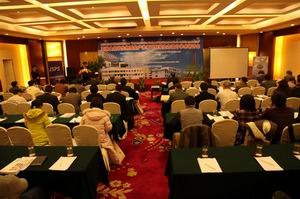Asia Science Seminar be successfully held by ISA in Changsha
On January 7 to 14, Asia Science Seminar on “Sustainable Eco-Design of Our Future on Food- and Bio-production” was successfully held by the Institute of Subtropical Agriculture (ISA) in Lotus Hotel, Changsha City, Hunan Province, China. The seminar was organized by the Bureau of International Co-operation, Chinese Academy of Science (BIC, CAS) and Japan Society for Promotion of Science (JSPS), supported by National Natural Science Foundation of China (NSFC), and sponsored by Institute of Subtropical Agriculture, Chinese Academy of Science (ISA, CAS) and Hokkaido University. More than 80 experts and trainees attended the seminar.
Prof. Kelin Wang from ISA, CAS, Prof. Hiroshi Fukunishi from JSPS Beijing Office, and Mrs Yinglan Zhang from the National Natural Science
Foundation of China (NSFC), made the opening addresses in the opening ceremony, respectively. In the seminar, Asian leading scientists from China, Japan, Thailand, New Zealand, and Magnolia given total 35 presentations on science frontier related to sustainability of food- and bio-production on standing point of agriculture, bio-production, bio-energy, land management, ecosystem design, and rural society activation, and warmly discussed with trainees. Experts and trainees visited Taoyuan Agro-ecological Observation and Research Station, CAS on January 11. Prof. Wenxue Wei and Prof. Xiaoli Xie, stationmaster and vice-stationmaster introduced research fields, experimental establishments, scientific and technological achievements to visitors. Most experts showed intense interests in the international scientific cooperation in the future.

All the trainees submitted the daily report related to the reports and got a certificate jointly granted by BIC, CAS and JSPS at the end of the seminar. Prof. Zhiliang Tan and Prof. Misuru Osaki jointly chaired the seminar. It promoted the communication of research achievements and academic thoughts in Asian scientists focus on agriculture, bio-production, bio-energy, land management, ecosystem design, and rural society activation, and it was helpful to the young scientists to recognize and grasp the related research frontiers through the seminar.
Download attachments: